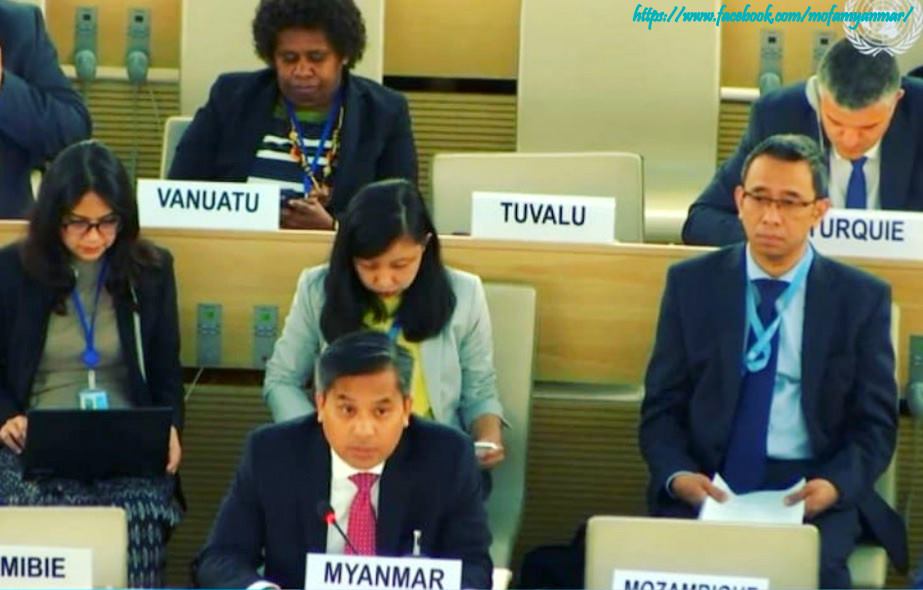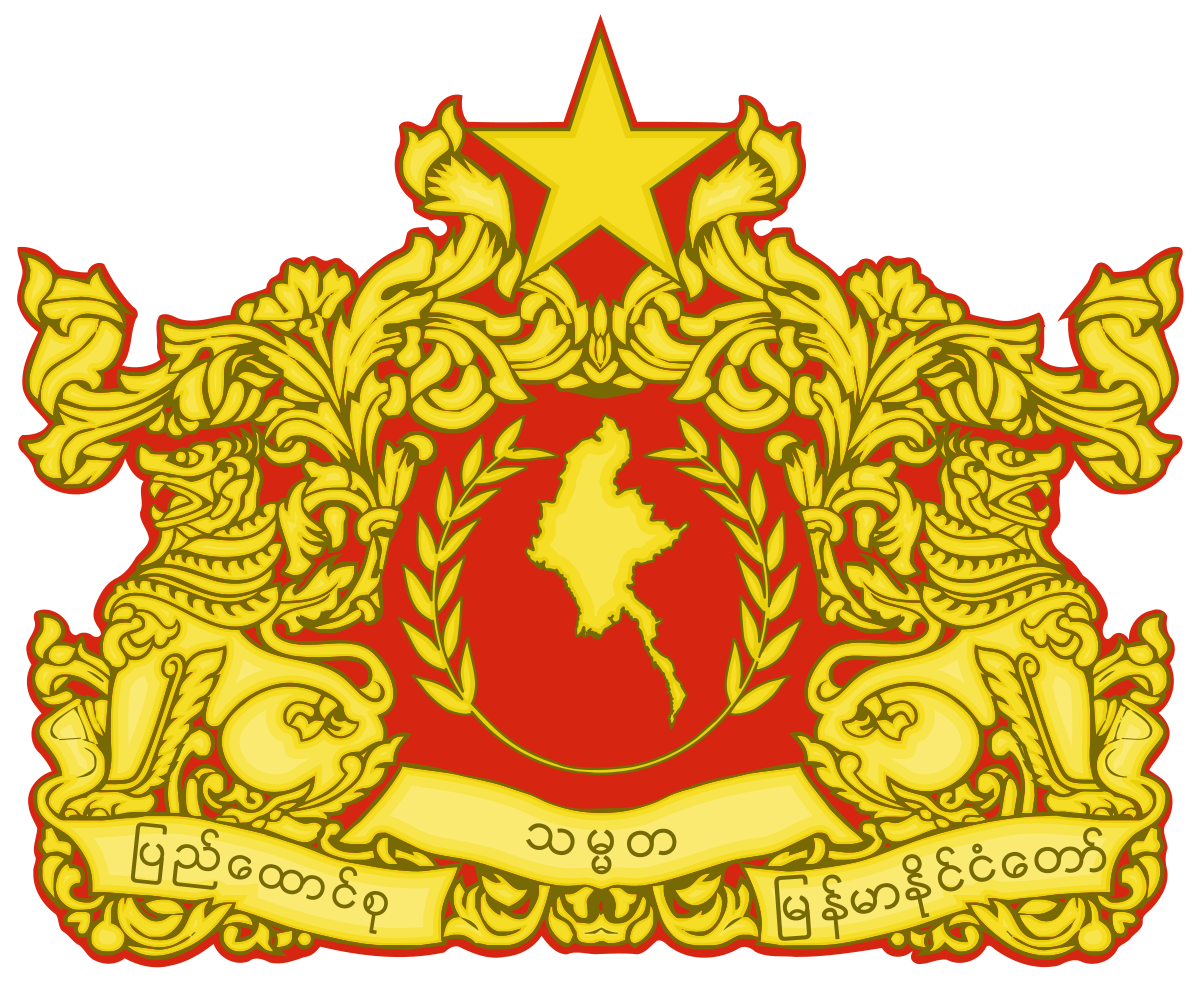Statement by Ambassador Kyaw Moe Tun, Permanent Representative of Myanmar at the Interactive dialogue with the High Commissioner for Human Rights during the 41st Session of Human Rights Council
Statement by Ambassador Kyaw Moe Tun, Permanent Representative of Myanmar at the Interactive dialogue with the High Commissioner for Human Rights during the 41st Session of Human Rights Council
Ministry of Foreign Affairs/ Nay Pyi Taw / July 12, 2019

(Geneva, 10 July 2019)
Mr. President,
Madam High Commissioner,
Myanmar participates in this dialogue in the spirit of constructive cooperation with the Human Rights Council even though Myanmar dissociated itself from and rejected the resolution S-27/1.
In the democratic transition of a multi-ethnic, multi-religious country like Myanmar, respect for human rights based on fairness and inclusiveness is vitalin creating fair and just society for all. Across the country, human rights awareness is promoted among all people through every possible channel. Universal Declaration of Human Rights is being translated into 10 ethnic languages.
Last week, during the Interactive Dialogue with the Special Rapporteur, our delegation briefed the Councilthe progress in the country.
Our focus, at this time, will be more on the situation in Rakhine State. While Rakhine has been the focus of much international attention, the narrative related to it has, sadly, been incomplete and misleading as unverified allegations have found their way to the reports of the Council.
Mr. President,
From the very beginning, our governmentidentified as a national priority the imperative need for rule of law and sustainable development in Rakhine.Accordingly, we established the Central Committee and its four working committees and, soon after, invited the late Dr. Kofi Annan to head an Advisory Commission to help us find lasting solution to the problems.
Please allow me, at this point, to pay tribute to Dr. Kofi Annan. With his immense wisdom and integrity, he had provided us with recommendations in his genuine desire for Myanmar to reach our goal of peace, prosperity and security in Rakhine.
With firm commitment, responsibility and dedication, Myanmarhascontinued its relentless efforts in implementing the recommendationsdespite challenges and a series of ARSA terrorist attacks. To date, 81 out of 88 recommendations are being implemented.
The Government has made significant progress in implementing social-economic development sector, infrastructure development such as construction of roads and electrifications. We are now focusing on the advancing on human aspects.
Two months ago, wecritically reviewed on the implementation process and more concrete steps are being taken to create more conducive condition for the returnees, especially in key priority areas: citizenship; freedom of movement; closure of nationwide IDP camps; education and health.
But ignoring all the Government’s efforts, some critics say that there is little or no effort by the authorities to create conditions for voluntary, safe and dignified return of displaced persons.It is important to look at the issue and prevailing situation objectively and impartially.
Mr. President,
The most pressing task today is to focus on nothing but commencing the repatriation process soonest to resolve the humanitarian situation.We are deeply concerned that, the on-set of monsoon season will have further disastrous effect on the displaced persons.
Myanmar has been ready to receive verified returnees since 23 January 2018 as agreed in “the Arrangement”. We have accordingly made preparations and arrangements for receiving verified returnees.
Myanmar provided Bangladesh, atthe first meeting of the Joint Working Group held in January 2018, with a list of more than 1200 verified displaced persons including 444 persons of Hindu faith who have repeatedly expressedtheir desire to return.
Myanmar has also verified 82% of the list of 22,432 persons provided by Bangladesh, despite its failure to fill up in prescribed form as bilaterally agreed. Among them, 11778 were verified as former residents; 106 as suspects involvement in the terrorist attacks; 6447 as not included in the registered list of family household in Myanmar. Even the breakdown list of 2976 displaced persons in village-wise and familywise has been informed to Bangladesh sidefor smooth and swift repatriation under the principle of voluntary, safe and dignified return. Since we have precedent before, we strongly hope that the successful repatriation can be made under the bilateral Arrangements in an amicable manner.In this regard, the genuine cooperation, sincerity, and focus on bilateral approach are imperative. Misusing international platforms including UN to put pressure on Myanmar should be strictly avoided.
Mr. President,
We have witnessed that a number of displaced persons had returned to Rakhine State on their own volition and arrangement. They have been systematically registered, processed and are now with their relatives in their own homes.
The national verification cards-NVC, a first step before getting citizenship,will be issued to verified returnees upon their arrival at the reception centres.
We are also working with the friendly nations in building houses for displaced persons. Here, I am pleased to inform that handing over ceremony of 250 pre-fabricated houses from Indian government was held yesterday in Rakhine. In this regard I thank India for its assistance.
To expedite the commencement, members of Joint Working Group from Myanmar will visitCox’s Bazar at a mutually convenient date in the later part of this month and talk to displaced persons about the repatriation process. We are hopingto receive fullest cooperation from Bangladesh. Myanmar is also planning to disseminate a factsheet among them. The factsheet will contain information including benefits of holding NVC.
With a view to assisting the Government in the implementation of the Arrangement for repatriation and resettlement, Myanmar signed the trilateral MOU with UNDP and UNHCR in June 2018 and it has been extended for one more year. Under the MOU, the Quick Impact Projects, being implemented by the UNDP and UNHCR with focus on the basic needs of all people, are welcomed by all communities in Rakhine.
The ASEAN, as Myanmar invited, will complement the works of the UN by facilitating the repatriation process through assistance of ASEAN AHA Centre in stages of repatriation. The ASEAN Emergency and Response and Assessment Team (ASEAN-ERAT) has successfully conducted a Preliminary Needs Assessment (PNA) in March 2019 and issued the report on the Preliminary Needs Assessment for Repatriation in Rakhine State in June. At the recent ASEAN Summit held in Bangkok, the leaders tasked the ASEAN Secretary-General to follow up the three recommendations contained in the report, namely, enhancing capacity of reception and transit centres; strengthening information dissemination, and support to the provision of basic services.
Mr. President,
Myanmar is fully committed to ensuring accountability where there is concrete evidence of human rights violation. The Independent Commission of Enquiry is investigating all alleged violations of human rights and atrocities committed in Rakhine as part of our efforts to address the issues of accountability. The ICOE has also requested Bangladesh already 3 times since January this year, for a visit to Cox’s Bazar. No response has been received from Bangladesh so far. Time and again, the Commission has stated that their report will be evidence based, not narrative based. To make a credible report, the Commission needs to have cooperation from Bangladesh. The mandate of ICOE has been extended to another 6 months, until 29 January 2020.
In addition, the Court of Inquiry was set up by the Military in March 2019 in conformity with Defences Services Rules to conduct further scrutiny over incidents related to terrorist attacks on 25 August 2017. It is now calling for the evidence and facts related to the incidents to be sent in persons or through email and post. In April, a legal advisory team was formed to give necessary advice to the Court.
Mr. President,
Alongside the repatriation process, we are intensifying our efforts for long term development and humanitarian assistance. Humanitarian assistance is being provided to all affected communities including IDPs through the government, our Union efforts - UEHRD, local NGOs, Red Cross Movement, WFP and ICRC. Ethnic Rakhine people constitute the largest among displaced persons due to massive attacks by AA insurgents. The Government has formed the Rakhine State and Peace and Stability Supporting Committee to prevent instigations that could cause instability in Rakhine State.
Visits of media personnel to northern Rakhine are organized regularly.
The government has launched a number of initiatives to promote inter-communal cohesion and confidence among all communities. In the last 12 months, more than 200 social cohesion activities were organized in cooperation with local NGOs and community groups.The plan to establish Peace University in Mrauk-U of Rakhine is now underway.
Public consultations between government and community leaders are conducted and feedback and comments are considered in policy making and implementation.
To sustain stability and prosperity in Rakhine, Rakhine investment Fair was held in February this year to bring in investment to this region.
We have consistently exerted all our efforts and resources in putting Rakhine’s development trajectory on track.
Mr. President,
In conclusion, challenges including the issue of Rakhine we are facing are complex. Complexity is compounded by the high expectation placed by the international community to overcome all the challenges in shortest time. We are resolute to overcome long and complex challenges with our concerted and relentless efforts.
These challenges will only be exacerbated and prolonged by continued unhelpful pressure, non-cooperative behaviour and non-constructive manner which inflame the discourse and detract from essential pursuit of a peaceful and diplomatic solution.We would like to again call upon the international community to join hands with us in a constructive and sincere way to find a sustainable solution towards a peaceful, stable and prosperous Rakhine for all.
Progress in every field will not be possible overnight, but our work in these 3 years has achieved wide ranging and durable impact on the ground.
I thank you, Mr. President.



